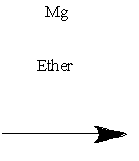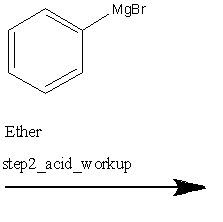Question
1. Why must Gringard reactions be anhydrous? A. The water will protonate the Grignard reagent B. The water will perform a nucelophilic substitution with the
| 1. Why must Gringard reactions be anhydrous? A. The water will protonate the Grignard reagent B. The water will perform a nucelophilic substitution with the product of the reaction C. The water will deprotonate the Grignard reagent D. The water will perform an electrophilic addition with the product of the reaction |
| 2. When performing a Grignard reaction it is also very important that the reaction be free from acetone (a chemical we commonly use to clean the glassware). Why must the glassware be free from acetone? A. Acetone is an electrophile that will react with the Grignard reagent B. Acetone reacts with the bromobenzene C. Acetone is a nucleophile that will react with the Grignard reagent D. Acetone reacts with the diethyl ether causing a side reaction to occur |
| During the work-up step, aqueous hydrochloric acid is added to the reaction and a gas is observed. What is the composition of the gas? A. Water |
| B. Carbon Dioxide C. Hydrogen D. Nitrogen E. Ether 4. Draw the Reaction Equation for the formation of the Grignard Reagent.
5. Draw the Reaction Equation for the formation of the alcohol.
Please answer ALL SIX questions and I will be sure to "thumbs up" your response! Thannk you! |
Mg Ether
Step by Step Solution
3.31 Rating (148 Votes )
There are 3 Steps involved in it
Step: 1

Get Instant Access to Expert-Tailored Solutions
See step-by-step solutions with expert insights and AI powered tools for academic success
Step: 2

Step: 3

Ace Your Homework with AI
Get the answers you need in no time with our AI-driven, step-by-step assistance
Get Started




